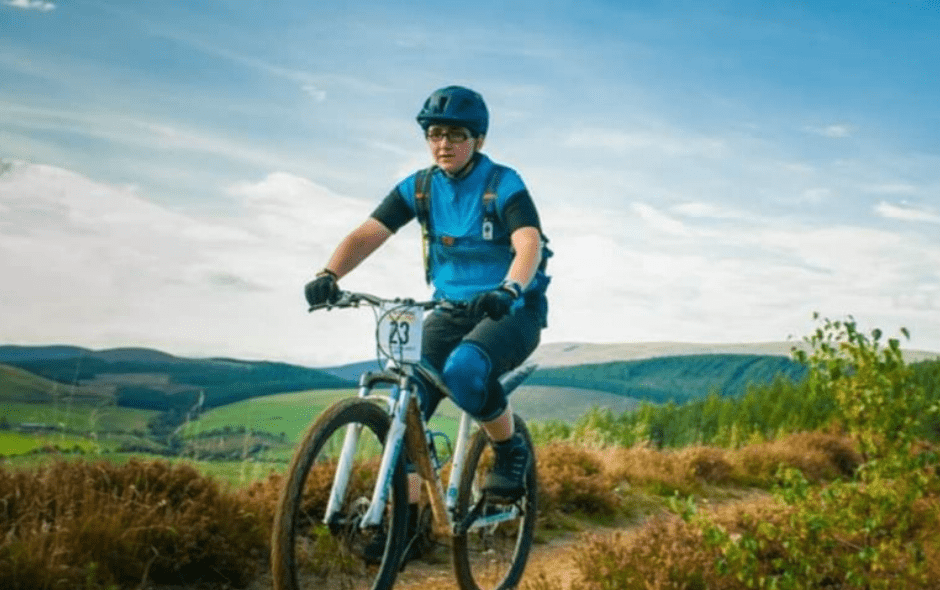Leanne was diagnosed with epilepsy when she was 18 years old. Here Leanne shares her story of living with epilepsy and how cycling has helped her have some independence.
How did you feel when you first out you had epilepsy?
Having my first seizure at 14 and not knowing what was going on was scary.
But after numerous tests over a couple of years, I got the official diagnosis of epilepsy, which did come as a bit of a relief as I finally knew what was going on.
At the time, I wasn’t given any information or support from my neurologist.
I was started on medication and told you won’t be able to do this or that and was sort of left to it, which at the time left me with so many unanswered questions and loads of uncertainty and hopelessness.
I was changed to a different neurologist who I still see. Also, I got a lot more information and support from him and was told about Epilepsy Scotland.
We always say that epilepsy is more than seizures. Do you feel this has been your experience?
Yeah there’s the side effects of medications, poor memory, constant appointments, numerous hospitals stays, feeling off, uncertainty, anxiety, every day not knowing when the next seizure will be.
In what way has Epilepsy Scotland’s wellbeing service helped you?
The wellbeing service has helped me by allowing me to meet others who understand what it’s like to live with epilepsy. I feel it’s a safe place where I won’t be judged.
The support groups are a safe space where you can go and if you don’t feel like talking the staff are understanding of that and don’t make you join in.
The wellbeing service has helped me develop a routine and it’s good to stay to a routine. Through the service, I have also learned ways to manage stress better, which helps my epilepsy.
When did you first start taking up cycling?
In 2015, I had a prolonged seizure and was left with a weakness in my left side. I needed to build up my strength again and I thought that cycling would help.
I took lessons to learn to ride and joined some group rides and found that I really enjoyed it, so I completed ride leader training to assist other riders.
It changed my life! I have achieved things that I never thought would be possible and have opened a whole new world for me. Now I have four bikes – hybrid, mountain, road, and a track bike.
Do you feel cycling helps you with your epilepsy?
Cycling has given me independence. It’s my escape where I can forget about everything.
By helping other people to enjoy cycling it makes me feel that I have a purpose.
It gives me something to stay focused on and work towards.
Over the last four years, I’ve taken part in quite a few events, which involve training leading up to the event. So staying focused and active seems to help my epilepsy.
What has been your favourite place to go cycling?
It’s hard to pick one place, which is my favourite there are a few. My dad lives in Dunoon and I enjoy going out on my mountain bike away up the hills. The views are amazing. It’s great to just escape for a bit.
Another favourite has to be the Glasgow and London nightrider, which was a 100 km cycle event during the night through the cities. It was different to see the city at night and the landmarks lit up.
In 2018, I took part in the Glasgow nightrider raising money for Epilepsy Scotland.
What would you say to someone who has been recently diagnosed with epilepsy?
Don’t let people tell you what you can and can not do. I lived many years listening to you can’t do that, it’s not safe, when in fact with a bit of thought and planning most of what I wanted to do could be achieved.
Once realising that my mindset changed and I became more positive and accepting of my epilepsy.
I am capable and I won’t let epilepsy stop me.
Is there anything you would like to add?
In 2019, I was in the cycling UK list of top 100 inspiring women in cycling, which was a confidence boost.
If you would like to share your experiences of living with epilepsy, please email David Coates our Communications Officer at dcoates@epilepsyscotland.org.uk or call 0141 427 4911.




